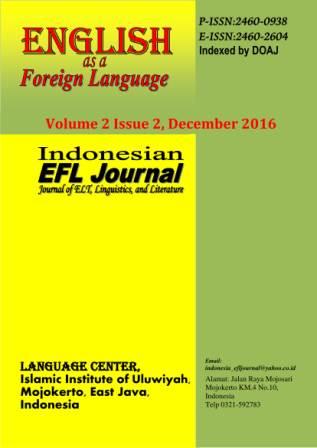Motivational Lexicon in Anthony Robbins’ Unlimited Power
Abstract
In the language learning process, motivation, one of psychological factors, has a great role in endorsing students to be a successful learner. Based on the issues, the choice of words that can influence the students to do the best is practically required by the teachers. So that, teacher as a motivator has a power to influence the students to take action for achieving their excellent learning, using what Anthony Robbins suggest on his book; Unlimited Power. The writer formulated the aims of this study as follow; (1) to identify the motivational lexicons in Unlimited Power from the psychological perspective, and (2) to describe how motivational lexicons in Unlimited Power take apart in the pedagogical field. This research used qualitative research to find out the data. The data analysis technique that researcher used is content analysis since they were texts in Unlimited Power. Researcher found three motivational lexicons used by Anthony Robbins in his book Unlimited Power; think, challenge, and remember. Think used as a tool to lead his readers to come to their memory, re-identify some main points, and consider about the certain thing. Challenge used to pump readers’ emotion, gave a test, and invited them to take action. Remember used as a tool to bring back a piece of information he provided before and try to keep it in readers’ mind. Anthony’s motivational lexicons in Unlimited Power also can use in the pedagogical field. Teacher can use them in the teaching-learning process as it determines the effectiveness of rewards for what students do and apparently influential factor for learning process.
References
Audrey, H., and Richard P.R. (1986). Fundamentals of Psychology, Fourth Edition, New York: Random House.
Benjamin. (2007). Psychology, An Introduction, Ninth Edition. New York: McGraw-Hill Companies Inc.
Cofer, C.N., & Appley. (1967). Motivation: Theory and Research. USA: John Wiley & Sons, Inc.
Cohen, L. (2007). Research Method in Education. USA: Routledge.
Carroll, D. (1999). Psychology of Language, USA: Brooks/Cole Publishing Company.
Fromkin, Victoria, Robert R, and Nina H. (2003).An Introduction to Language. USA: Heinle.
Henry, G., Alan J. Fridlund, and Daniel R.(2004). Psychology Sixth Edition, W.W. Norton &Company, Inc.
Langhan, D., and Belinda T. (2007).Fresh Perspectives: Introduction to Psychology, South Africa: Pearson Education South Africa.
Mursell. (1939). The Psychology of Secondary-School Teaching, Rev.Ed.,Bew York: W.W. Norton &Co.
Morgan, C. (1961). Introduction to Psychology Second Edition, London: McGraw-Hill Book Company, Inc.
Moskowitz, M., and Arthur R. Orgel. (1969).General Psychology: A Core Text in Human Behavior, USA: Houghton Mifflin Company.
Panther, K.U and Gunter R. (2011). Motivation in Grammar and the Lexicon, USA: John Benjamins Publishing Company.
Ratna, K.N. (2012). Teori, Metode, dan Teknik Penelitian Sastra.Yogyakarta: PustakaPelajar.
Singer, R. (1975). Motor Learning and Human Performance: An Application to Motor Skills and Movement Behaviors Third Edition, USA: Macmillan Publishing Co. Inc.
Sugiyono. (2008).MetodePenelitian Kualitatif, Kuantitatif dan R&D. Bandung: Alfabeta.
Skinner, C. (1958).Essentials of Educational Psychology, USA: Prentice-Hall, Inc.
Slavan, R. (2009). Educational Psychology: Theory and Practice, 9th ed., New Jersey: Pearson Education Inc.
Westbrook, L. (2014). Qualitative Research Methods, www.deepblue.lib.umich.edu, on Sunday, December 7.
Wiersma, W. (1995). Research Methods in Education, USA: Needam Heights.
https://en.m.wikipedia.org/wiki/Tony_Robbins, taken on March 15, 2015.
Copyright (c) 2016 Indonesian EFL Journal: Journal of ELT, Lingusitics, and Literature

This work is licensed under a Creative Commons Attribution-ShareAlike 4.0 International License.
All rights reserved.
this publication may be reproduced, stored in a retrieval system, or transmitted
in any form or by any means, electronic, mechanical, photocopying, recording.




